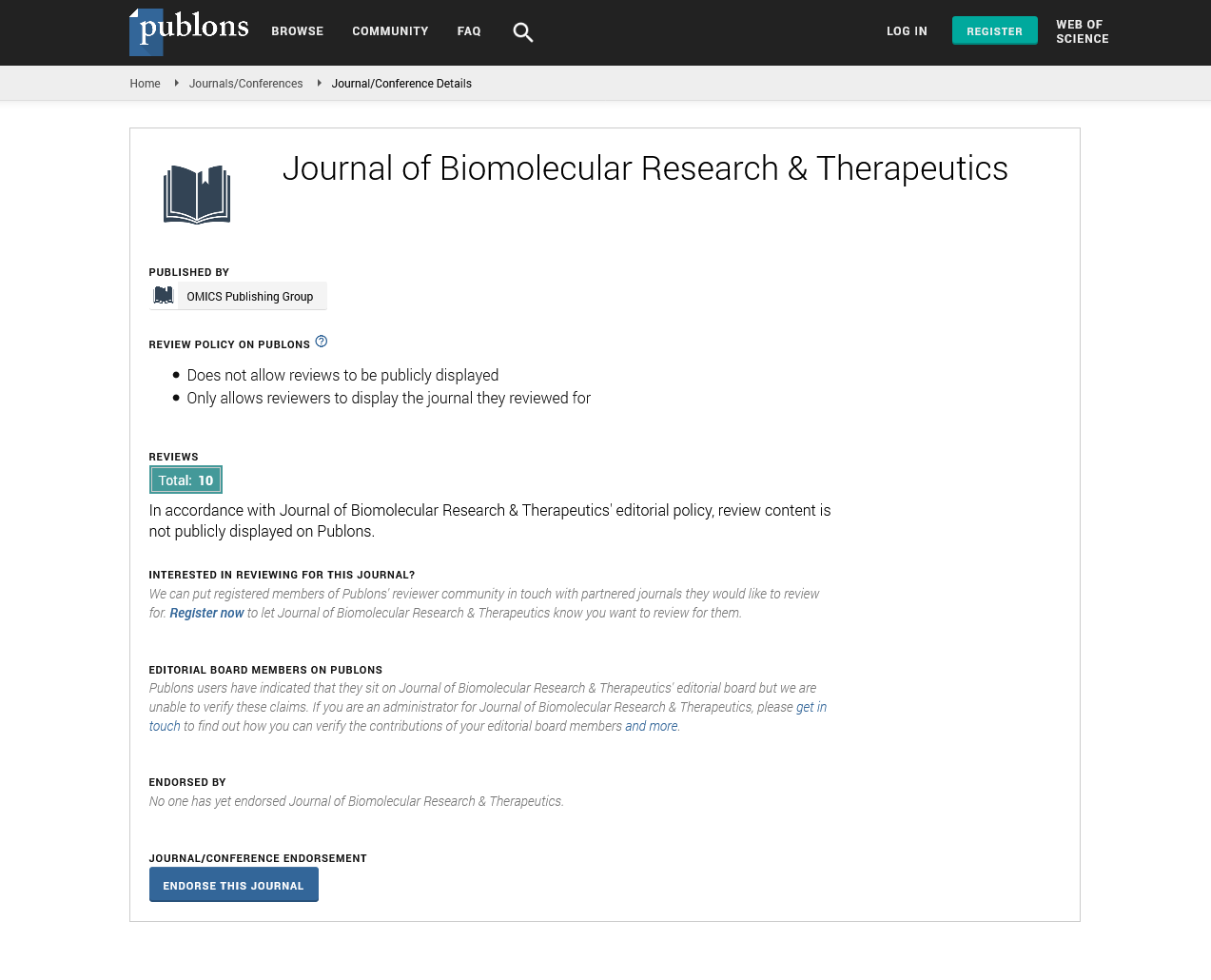Indexed In
- Open J Gate
- Genamics JournalSeek
- ResearchBible
- Electronic Journals Library
- RefSeek
- Hamdard University
- EBSCO A-Z
- OCLC- WorldCat
- SWB online catalog
- Virtual Library of Biology (vifabio)
- Publons
- Euro Pub
- Google Scholar
Useful Links
Share This Page
Journal Flyer

Open Access Journals
- Agri and Aquaculture
- Biochemistry
- Bioinformatics & Systems Biology
- Business & Management
- Chemistry
- Clinical Sciences
- Engineering
- Food & Nutrition
- General Science
- Genetics & Molecular Biology
- Immunology & Microbiology
- Medical Sciences
- Neuroscience & Psychology
- Nursing & Health Care
- Pharmaceutical Sciences
Commentary - (2024) Volume 13, Issue 1
Revolutionizing Medicine: Recombinant Protein Therapeutics in Modern Healthcare
Victoria Blake*Received: 29-Jan-2024, Manuscript No. BOM-24-25312; Editor assigned: 31-Jan-2024, Pre QC No. BOM-24-25312 (PQ); Reviewed: 14-Feb-2024, QC No. BOM-24-25312; Revised: 21-Feb-2024, Manuscript No. BOM-24-25312 (R); Published: 28-Feb-2024, DOI: 10.35248/2167-7956.23.13.373
Description
In the modern healthcare, the development and utilization of recombinant protein therapeutics have accompanied in a new era of treatment modalities. These innovative biopharmaceuticals, engineered through genetic manipulation techniques, have revolutionized the management of various diseases, offering targeted and efficacious therapies with reduced adverse effects. This transformative approach holds immense capability across diverse medical fields, ranging from oncology and immunology to rare genetic disorders and infectious diseases.
At the core of recombinant protein therapeutics lies the process of genetic recombination, which involves the insertion of specific DNA sequences into host organisms, such as bacteria, yeast, or mammalian cells. This genetic engineering enables the production of proteins that mimic naturally occurring molecules, including hormones, enzymes, antibodies, and cytokines, among others. By exploit the power of biotechnology, researchers can manufacture these proteins in large quantities with high purity and consistency, ensuring reproducible therapeutic outcomes.
One of the defining achievements of recombinant protein therapeutics is the production of monoclonal Antibodies (mAbs), which have emerged as foundation treatments for various diseases. These engineered antibodies exhibit remarkable specificity in targeting disease-associated antigens, thereby modulating immune responses and exerting therapeutic effects. From the pioneering anti-cancer mAb, rituximab, to the innovative anti-inflammatory agent, adalimumab, mAbs have transformed the landscape of oncology, rheumatology, and beyond, offering patients new avenues for managing complex medical conditions.
In addition to monoclonal Antibodies (mAbs), recombinant protein therapeutics encompass a diverse array of biologics designed to address unmet medical needs. For instance, recombinant insulin has revolutionized the management of diabetes, providing patients with a safer and more effective alternative to animal-derived insulin. Similarly, growth factors like erythropoietin and granulocyte colony-stimulating factor (GCSF) have revolutionized the treatment of anemia and neutropenia, respectively, in patients undergoing chemotherapy or suffering from certain hematological disorders.
Furthermore, recombinant protein therapeutics have played a pivotal role in advancing personalized medicine approaches, particularly in the field of immuno-oncology. By leveraging recombinant proteins, researchers can engineer Chimeric Antigen Receptor (CAR) T-cell therapies, which involve modifying patients' own immune cells to target and destroy cancer cells with precision. This innovative approach has yielded unprecedented clinical responses in hematologic malignancies, offering hope for patients with refractory or relapsed cancers.
Beyond oncology, recombinant protein therapeutics hold immense potential for addressing rare genetic disorders, where conventional small molecule drugs may be inadequate. Enzyme Replacement Therapies (ERTs), for example, offer life-changing treatments for individuals with lysosomal storage disorders, such as Gaucher disease and Fabry disease. By administering recombinant enzymes intravenously, ERTs can mitigate disease progression and improve patients' quality of life, underscoring the transformative impact of biologics in rare disease management. Moreover, the advent of novel biotechnologies, such as Clustered Regularly Interspaced Short Palindromic Repeats (CRISPR-Cas9) gene editing, capability to further enhance the therapeutic potential of recombinant protein technologies. By precisely editing genetic sequences, researchers can engineer cells to produce therapeutic proteins directly within the body, bypassing the need for exogenous protein administration.
Conclusion
Recombinant protein therapeutics represent a foundation of modern healthcare, offering targeted and effective treatments across a spectrum of diseases. Through genetic engineering and biotechnological innovation, researchers continue to expand the repertoire of biologics, driving forward the frontier of personalized medicine and precision therapeutics. As we navigate the complexities of human health and disease, recombinant protein therapeutics stand as a testament to the transformative power of science and innovation in improving patient outcomes and advancing medical progress. This fundamental changes towards in vivo protein production holds profound implications for the treatment of genetic disorders, as well as for the development of next-generation biopharmaceuticals.
Citation: Blake V (2024) Revolutionizing Medicine: Recombinant Protein Therapeutics in Modern Healthcare. J Biomol Res Ther. 13:373.
Copyright: © 2024 Blake V. This is an open-access article distributed under the terms of the Creative Commons Attribution License, which permits unrestricted use, distribution, and reproduction in any medium, provided the original author and source are credited.

